Calif. Editor Accused of Blowing Off Diversity
2 N.Y. Times Reporters Out After Controversies
WCBS-TV Staffers Join Complaints Against CBS
NABJ Urges a Black President for ABC News
2 Each Get $100K for Writing on Underrepresented
Journalists Guide Readers, Viewers on COVID
HBCU Editor Prompts Change in Local Media
Leon Tucker Named Editor in Lakeland, Fla.
Kristen Go, Michelle Maltais Rise at USA Today
Thompson to Head New NPR Investigations Team
Hearst, Vice Media Release Diversity Figures
. . . Diversity Gains in Vice Executive Team
Brighter Futures for 2 at VOA With Trump Gone
China Investing Massively in African Media
[btnsx id=”5768″]
Michael Connelly and Myron Levin talk about Connelly’s novel, “Fair Warning,” and the actual nonprofit news organization, FairWarning.org. (Credit: YouTube)
Calif. Editor Accused of Blowing Off Diversity
A white writer’s claim that the editor of a California journalism nonprofit told him that he was not interested in diversity because “We’re not woke” has sparked an outcry on Twitter, a vigorous denial from the editor that he uttered those words and a statement from the organization’s two staff writers that if the editor does not resign, “then we cannot continue as staff writers.”
 The original tweet came from Matt Krupnick (pictured), who describes himself as “a freelance reporter and editor who contributes regularly to The New York Times, The Guardian, The Washington Post and the Hechinger Report. He also has produced the ‘Future U’ podcast with Jeffrey Selingo and Michael Horn.
The original tweet came from Matt Krupnick (pictured), who describes himself as “a freelance reporter and editor who contributes regularly to The New York Times, The Guardian, The Washington Post and the Hechinger Report. He also has produced the ‘Future U’ podcast with Jeffrey Selingo and Michael Horn.
“He was a reporter with the Center for Public Integrity’s State Integrity Investigation and is a member of Investigative Reporters and Editors and the Education Writers Association,” Krupnick says on his website. “He reported regularly from Mexico while living in Oaxaca. In 2020, he was named best beat reporter for 2019 by the Education Writers Association.”
Krupnick’s Twitter thread began Tuesday with:
“I recently was offered an editor job at a small California investigative journalism nonprofit I respect. It seemed like a really interesting opportunity. I noted to the founder/editor that diversity seemed to be a challenge there.
“The entire staff (and board) is white and I haven’t found a single article written by a person of color. When I mentioned to the editor that I wanted to diversify the freelance pool, this was his response: ‘We’re not woke.’
“The editor went on to explain why he was reluctant to bring in diverse journalists. ‘I don’t want them writing about racial justice and stuff like that. That’s not what we do here.’
“I explained that 1) a journalist of color can write about any issue a white journalist can, and 2) racial justice can and should be part of a lot of investigative stories. He didn’t buy it. . . . “
Krupnick went on to explain, “I’m still considering whether to name the publication. I wouldn’t want to hurt the reporters there. But, to address some guesses, it was NOT Cap&Main.”
 Then came the response from Myron Levin (pictured), a former Los Angeles Times reporter who founded and edits Fair Warning, which describes itself as “a nonprofit (501(c)(3)) investigative news organization that focuses on public health, consumer, workplace and environmental issues, and related topics of government and business accountability.”
Then came the response from Myron Levin (pictured), a former Los Angeles Times reporter who founded and edits Fair Warning, which describes itself as “a nonprofit (501(c)(3)) investigative news organization that focuses on public health, consumer, workplace and environmental issues, and related topics of government and business accountability.”
Levin wrote, “I read Matt Krupnick’s Twitter thread with amazement [PDF]. Yes, he did apply for a job here and we talked about many things, but much of what he says about the conversations is untrue or seriously distorted, and an all-around smear. As a journalist, he should know better than to bend the truth.
“I never said I was ‘reluctant to bring in diverse journalists.’ I never said a journalist of color can’t write
about issues a white journalist can. That I would ever think or say this is absurd. I never told Matt that I wasn’t interested in his ideas about improving the operation.
“Journalists of color have worked for FairWarning, though it is true that the staff now is entirely white.
Just to be clear, FairWarning has a staff of three, including me.

“If Matt had come to work here, he would have been the fourth white face in our tiny newsroom. We did advertise the position on the job boards of the National Association of Black Journalists and the National Association of Hispanic Journalists, which Matt knows because I told him. We have made other efforts to recruit journalists of color. We do not tolerate racism in our newsroom. We know that we have work to do on diversity, and we are working to diversify our board. We are very rarely in a position to hire — our budget doesn’t allow it — but when we are, we are interested in talking to candidates from diverse backgrounds. . . .”
Levin offered a former employee as a character witness.
The issue would have remained a he-said-he-said had the staff members not spoken up.
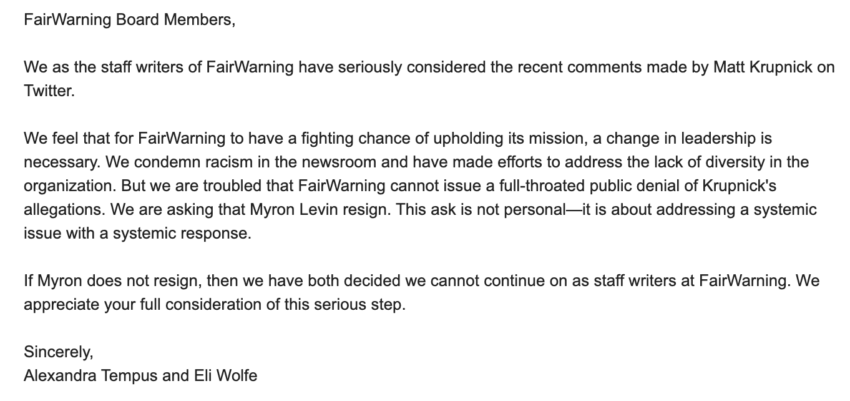
Alexandra Tempus and Eli Wolfe wrote to the board members, “We feel that for FairWarning to have a fighting chance of upholding its mission, a change in leadership is necessary. . . . If Myron does not resign, then we have decided we cannot continue as staff members at FairWarning.”
Asked Thursday if he had any thoughts after seeing Levin’s defense, Wolfe referred Journal-isms to his and Tempus’ message to the board.
The same question was asked Friday of Krupnick. He messaged Journal-isms, “Yes, I stand by those comments in the strongest possible way. I was taking notes as Myron said these things. I have zero reason to make this up about someone who offered me a job and every reason to keep it to myself. I felt it was important to let people know what bias — unconscious or otherwise — looks like. It’s shameful that someone who thinks (and acts) the way Myron does would attack my integrity.
“I’d also like to make it clear: I’m not the one who revealed Myron had said these things. I had kept it anonymous until Myron himself released his statement denying them. I’m not sure why he chose to out himself in this way, but I had planned on keeping his name to myself. I hope he’ll do the right thing now and step down.”
Board member Michael Connelly, journalist and novelist, said through a spokesperson, “The board is seriously investigating the issue and Michael can’t comment until that investigation is finished.”

Two N.Y. Times Reporters Out After Controversies
“Two journalists responsible for some of The New York Times’s most high-profile work of the last three years have left the paper after their past behavior was criticized inside and outside the paper,” Marc Tracy reported Friday for the Times.
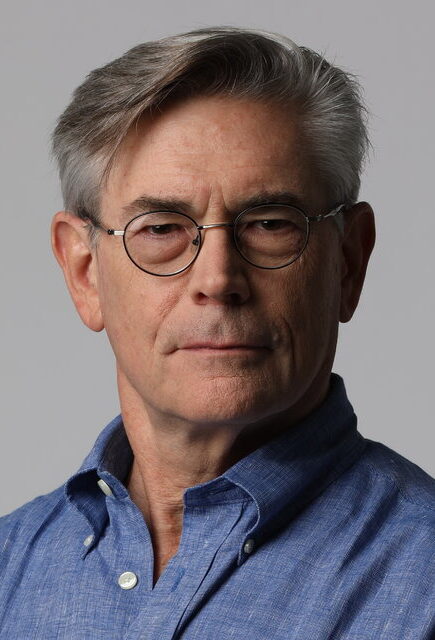 “In two memos on Friday afternoon, Dean Baquet, the paper’s executive editor, and Joe Kahn, the managing editor, informed the staff of the departures of Donald G. McNeil Jr.(pictured), a science correspondent who reported on the coronavirus pandemic, and Andy Mills, an audio journalist who helped create ‘The Daily’ and was a producer and co-host of ‘Caliphate,’ a 2018 podcast that was found to have serious flaws after an internal investigation.
“In two memos on Friday afternoon, Dean Baquet, the paper’s executive editor, and Joe Kahn, the managing editor, informed the staff of the departures of Donald G. McNeil Jr.(pictured), a science correspondent who reported on the coronavirus pandemic, and Andy Mills, an audio journalist who helped create ‘The Daily’ and was a producer and co-host of ‘Caliphate,’ a 2018 podcast that was found to have serious flaws after an internal investigation.
“Mr. McNeil, a veteran of The Times who has reported from 60 countries, was an expert guide on a Times-sponsored student trip to Peru in 2019. At least six students or their parents complained about comments he had made, The Daily Beast reported last week. The Times confirmed he used a ‘racist slur’ on the trip.
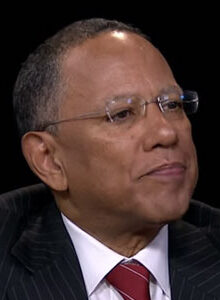 “In their memo, Mr. Baquet (pictured) and Mr. Kahn wrote that Mr. McNeil ‘has done much good reporting over four decades’ but added ‘that this is the right next step.’ ”
“In their memo, Mr. Baquet (pictured) and Mr. Kahn wrote that Mr. McNeil ‘has done much good reporting over four decades’ but added ‘that this is the right next step.’ ”
Tracy also wrote, “In a statement to Times staff on Friday, Mr. McNeil wrote that he had used the slur in a discussion with a student about the suspension of a classmate who had used the term.
“ ‘I should not have done that,’ he wrote. ‘Originally, I thought the context in which I used this ugly word could be defended. I now realize that it cannot. It is deeply offensive and hurtful.’ ”
However, in a Wednesday afternoon letter signed by more than 150 staffers and addressed to Baquet along with other top members of the Times masthead, employees noted “that in the days since The Daily Beast’s article, current and former staffers have also said that McNeil had shown ‘bias against people of color in his work and in interactions with colleagues over a period of years,’ ” Maxwell Tani and Lachlan Cartwright reported Wednesday for the Daily Beast.

WCBS-TV Staffers Join Complaints Against CBS
“In the wake of a Los Angeles Times investigation, which detailed allegations of racism and misogyny at CBS’ Philadelphia TV station, current and former employees of CBS’ flagship station, WCBS-TV Channel 2 in New York, have alleged that they also worked in a ‘hostile environment‘ where Black, Latino, Asian and gay employees were treated poorly, and stories that occurred in Black and Latino neighborhoods were at times overlooked.
 “ ‘The first question was always: Where is the story? How is the neighborhood?’ Ken Racioppi (pictured), a former WCBS news producer, said. He added that when managers learned about news events in communities of color,’ All of the sudden, the interest level would just drop.’
“ ‘The first question was always: Where is the story? How is the neighborhood?’ Ken Racioppi (pictured), a former WCBS news producer, said. He added that when managers learned about news events in communities of color,’ All of the sudden, the interest level would just drop.’
“Late Friday [Jan. 29], CBS Entertainment Chief Executive George Cheeks announced that CBS had hired law firm Proskauer Rose to investigate conduct by CBS Television Stations President Peter Dunn and his lieutenant in charge of local news, David Friend. The two executives have managed operations at WCBS for more than a decade.
“Separately, New York Atty. Gen. Letitia James’ office last year began looking into claims of race discrimination against Black employees at WCBS, according to four people familiar with the matter but not authorized to comment. One of two former WCBS employees who said they were interviewed by investigators with the agency’s civil rights division said the office was interested in whether there is ‘a pattern of racial discrimination’ at WCBS. . . . “
James also wrote, “Nine current and former WCBS employees told The Times that station management seemed uninterested in providing more robust coverage of communities of color. Two CBS employees said that management moved slowly to improve diversity at WCBS. In October 2019, a newsroom veteran provided resumes of nine people of color to be considered for open positions — but none were hired, according to this person, who asked not to be identified for fear of losing their job.
“That same month, the station ran a promotional spot featuring 14 of its journalists, but absent was Aundrea Cline-Thomas, who was then the station’s only Black full-time reporter. (The station eventually added a photo of Cline-Thomas to the promo, the source said.)
“ ‘Mr. Dunn is extremely proud of the actions he took during his long and successful tenure at CBS and the progress that was made to improve diversity and inclusion across the entire CBS station group including WCBS NY,’ Larry Hutcher, Dunn’s attorney, said Monday in a statement. ‘Any decisions affecting hiring or termination were based solely on performance…. Peter Dunn is confident that any investigation CBS conducts will show his conduct to be exemplary and without fault.’ ”
- Dominic Patten, Deadline: WGA Seeks Sit-Down With CBS Over Probe Into Alleged Racist, Sexist Behavior By Local TV Execs
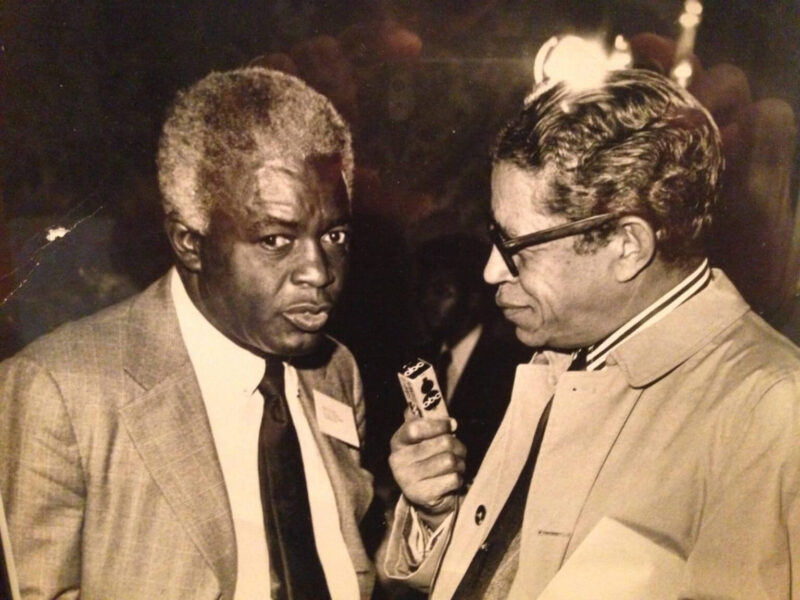
Mal Goode, right, with Jackie Robinson, baseball Hall of Famer and civil rights icon, in undated photo.
NABJ Urges a Black President for ABC News
“In the history of television, no African American has ever run a network news division,” the National Association of Black Journalists said in a statement Wednesday. “With the news of James Goldston’s decision to step down after 17 years at ABC News, National Association of Black Journalists (NABJ) leaders say the time for that glass ceiling to be broken is now.”
“ ‘In the 53 years since the Kerner Commission called on news media outlets to increase the hiring of Black anchors, reporters and editors, our industry has made a number of strides,’ said NABJ President Dorothy Tucker. ‘African Americans have ascended to the top ranks of running publications like The New York Times, and just this week the first Black head of a cable news network started at MSNBC. But never have we seen an African American run a broadcast news network. That needs to change in 2021.’
“Ken Lemon, NABJ Vice President-Broadcast, said it’s only fitting for ABC News to break this barrier, which would exemplify a commitment to diversity, equity and inclusion at the highest levels of the industry.
“ ‘In 1962, ABC hired Mal Goode as the first network news correspondent, and in 1978, NABJ co-founder Max Robinson was named the first Black network evening news anchor,’ Lemon said. ‘While progress has been made in front of the camera, it’s time for Black advancement in the executive suites.’ . . . ”
An ABC spokesperson did not respond to a request for comment.
2 Each Get $100K for Writing on Underrepresented
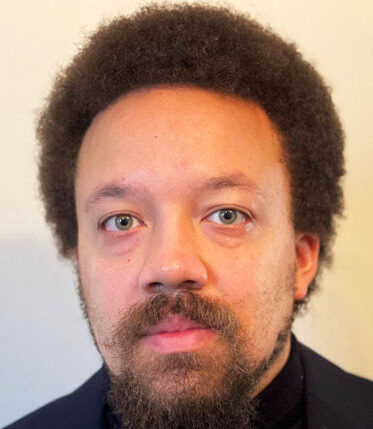 Freelance journalists David Dennis Jr. (pictured at left) and Michelle García (pictured below) are the recipients of the 2021 American Mosaic Journalism Prize, which includes an unrestricted cash prize of $100,000 for each, the Heising-Simons Foundation announced Friday.
Freelance journalists David Dennis Jr. (pictured at left) and Michelle García (pictured below) are the recipients of the 2021 American Mosaic Journalism Prize, which includes an unrestricted cash prize of $100,000 for each, the Heising-Simons Foundation announced Friday.
“Dennis’ journalism includes a 2020 cover story in Atlanta Magazine, ‘Ahmaud Arbery Will Not Be Erased,’ which sheds light on the injustice — and historical pattern leading up to — the murder of a young Black man in Georgia, and a piece in Gay Mag, ‘An Ode To The Black Women At Dillard’s,’ that reflects on the solidarity and community Black women have fostered over department store counters. . . . .
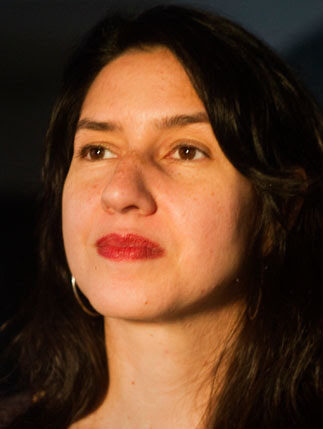 “García is a freelance print, audio and broadcast journalist who writes on issues related to U.S. identity, race and national histories, specifically in the U.S. West and border. Her recent work has both unveiled human rights abuses and celebrated the humanity of those living in limbo at the U.S.-Mexico border. “
“García is a freelance print, audio and broadcast journalist who writes on issues related to U.S. identity, race and national histories, specifically in the U.S. West and border. Her recent work has both unveiled human rights abuses and celebrated the humanity of those living in limbo at the U.S.-Mexico border. “
“The Prize is awarded for excellence in long-form, narrative, or deep reporting about underrepresented and/or misrepresented groups in the United States. It recognizes journalism’s ability to foster understanding and empathy, and aims to support freelance journalists. . . .”
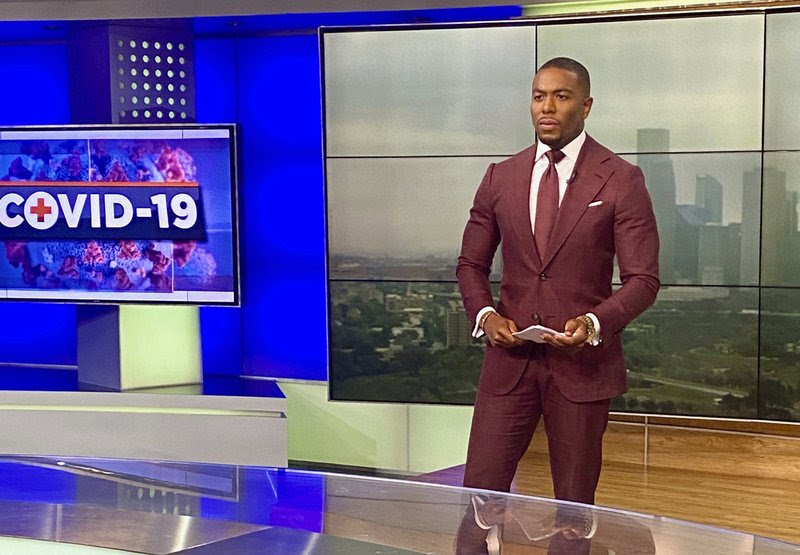
Journalists Guide Readers, Viewers on COVID
“Calling a hospital to see if a bed was available for a COVID-19 patient isn’t part of Houston television news anchor Chauncy Glover’s job description. Neither is guiding a viewer online to find a place to be vaccinated,” David Bauder reported Saturday for the Associated Press.
“He’s done both, and isn’t alone. Listeners and readers across the country are reaching out directly to journalists for help during the coronavirus pandemic, and many are responding.
“ ‘We are now doing more than we bargained for,’ Glover said. ‘We have to be smarter on these topics. We have to know more. For so many people, it may be life or death.’
“It began for Glover last spring, when he came down with COVID-19 and told his story to KTRK-TV viewers. By phone, email and text, he was peppered with questions after getting back to work: What did it feel like? Should I be worried if I have this symptom? What did you do during quarantine to keep from going crazy?”
Bauder also wrote, “CC Davidson-Hiers, a reporter for the Tallahassee Democrat in Florida, has lost track of how many requests she’s gotten, many from elderly readers who can’t navigate online vaccination sign-ups.
“It’s an abrupt turnaround from last year, when her inbox was filled with vitriol from people who called her an alarmist or worthless human being trying to scare people, just because she was writing about COVID-19. . . .”
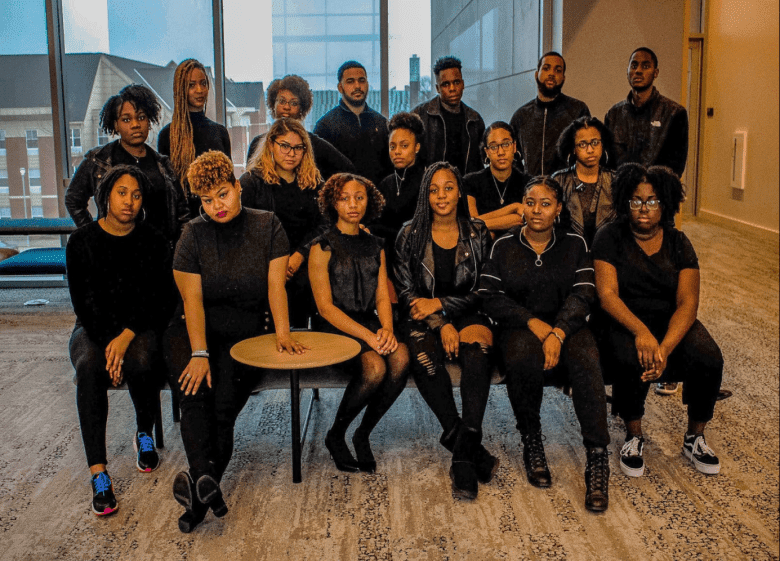
HBCU Editor Prompts Change in Local Media
“In 2018, I was the editor-in-chief of The A&T Register, the on-campus student newspaper for the largest historically Black university in the nation, North Carolina A&T State University,” Alexis Wray reported Tuesday for Scalawag, “a journalism and storytelling organization that illuminates dissent, unsettles dominant narratives, pursues justice and liberation, and stands in solidarity with marginalized people and communities in the South.”
Wray wrote, “Frustrated by the consistent lack of Black perspectives in the media, for nine months during 2018 and 2019, I led a group of fellow students through an in-depth dive of local news reporting coming out of Greensboro, identifying the ways outlets covered our school. Our data confirmed what we’d suspected: That media outlets were using the university as a locator for crime in East Greensboro even though those crimes rarely — if ever — had anything to do with the campus, students, or faculty.”
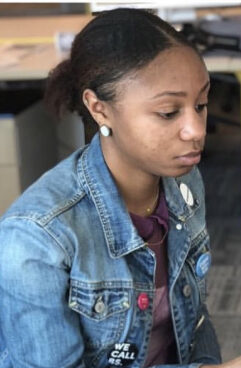 Wray (pictured) also recalled, “Media representatives from four of the outlets we identified — the News & Record, Carolina Peacemaker, The Rhino Times and WFMY News 2 — agreed to come to campus for a roundtable discussion on April 12, 2019. . . . Despite their responses at the roundtable, Greensboro news outlets did seem to find new ways to frame crime stories in their headlines.”
Wray (pictured) also recalled, “Media representatives from four of the outlets we identified — the News & Record, Carolina Peacemaker, The Rhino Times and WFMY News 2 — agreed to come to campus for a roundtable discussion on April 12, 2019. . . . Despite their responses at the roundtable, Greensboro news outlets did seem to find new ways to frame crime stories in their headlines.”
Wray’s message to fellow HBCU journalists:
“I felt consumed by this investigation. I couldn’t escape the nasty reality of journalists who don’t know how to cover communities of color.
“This reporting deterred me from a traditional career in journalism.
“I was tired of writing about the issues and decided to be a part of the change. I now use my passion for storytelling in nonprofit work, and I am able to focus on telling the people’s narrative through a new lens.
“While this investigation played a huge part in what my career looks like today it is also a reminder that my work isn’t over. Biased coverage rooted in unconscious racism not only affects HBCUs but communities of color throughout the country, and I will continue to work and fight to combat false narratives.
“There is power in student journalism. . . .”
Leon Tucker Named Editor in Lakeland, Fla.
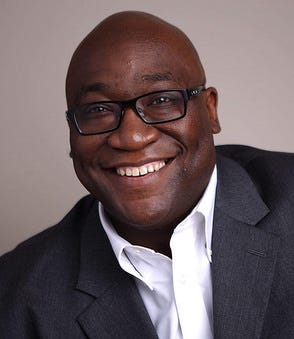 “A longtime journalist with Gannett, who most recently worked in public relations, is taking over the helm of The Ledger newsroom, Gannett officials announced Wednesday,” Kimberly C. Moore wrote for the Lakeland, Fla., news organization.
“A longtime journalist with Gannett, who most recently worked in public relations, is taking over the helm of The Ledger newsroom, Gannett officials announced Wednesday,” Kimberly C. Moore wrote for the Lakeland, Fla., news organization.
“Leon Tucker (pictured) was named executive editor, the first Black person to hold that position in the newspaper’s 97-year history.
” ‘Leon is coming home,’ said Cindy McCurry-Ross, Gannett Florida Editor, noting that Tucker grew up in St. Petersburg and spent much of his early career at Florida papers. ‘Leon is overjoyed to be returning to public service journalism.’
“She described him as a collaborator with a diplomatic approach.
“Tucker is a 1998 graduate of Florida A&M University, from which he earned a bachelor’s degree in newspaper journalism. While at FAMU, he won the prestigious William Randolph Hearst Award for breaking news for a college newspaper reporter, one of only six awarded in the country annually.
“Since then, he has worked as a reporter at The Tennessean in Nashville and The St. Petersburg Times (now The Tampa Bay Times), an assistant metro editor at the Fort Myers News-Press and the Delaware News-Journal in Wilmington, and was metro editor and managing editor at The Courier-Post in Cherry Hill, New Jersey. . . .”
In August, Gannett announced a broad initiative to make its workforce as diverse as the country by 2025 and to expand the number of journalists focused on covering issues related to race and identity, social justice and equality.
Gannett also said it planned to increase by 30% the share of BIPOC (Black, Indigenous, people of color) in leadership positions.
Kristen Go, Michelle Maltais Rise at USA Today
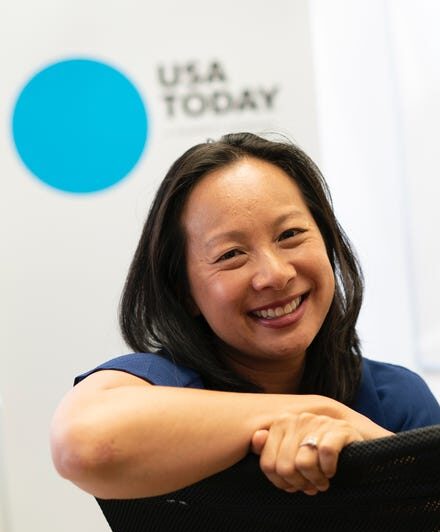 “USA TODAY has promoted Kristen Go (pictured) to executive editor for news and initiatives, a move that elevates her to the newsroom’s highest-ranking positions,” Jessica Guynn reported Friday for Gannett-owned USA Today.
“USA TODAY has promoted Kristen Go (pictured) to executive editor for news and initiatives, a move that elevates her to the newsroom’s highest-ranking positions,” Jessica Guynn reported Friday for Gannett-owned USA Today.
“Go will supervise teams covering consumer news and technology, life and entertainment, travel, education, and enterprise reporting focused on equity issues such as race, identity and social justice. She will report to Editor-in-Chief Nicole Carroll.
“In addition, USA TODAY on Friday announced new senior leadership roles for three other journalists:
- Kristen DelGuzzi, who becomes managing editor for opinion.
- Michelle Maltais, who becomes managing editor for consumer news.
- Caren Bohan, who becomes managing editor for politics and Washington.
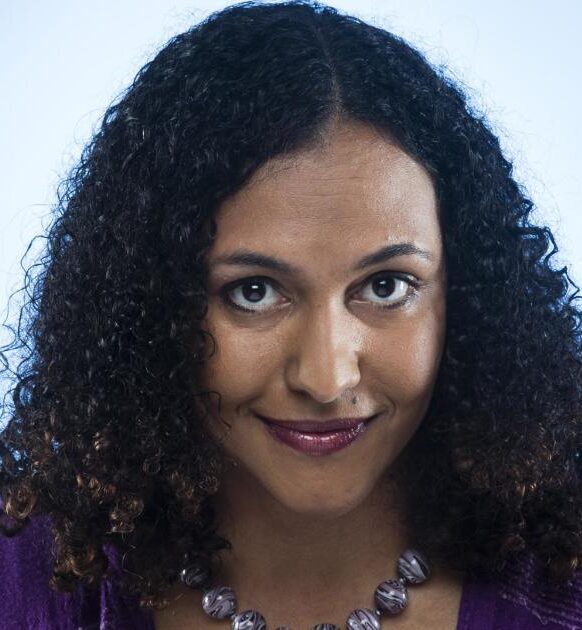 Maltais (pictured) was cited last summer as an example of how Black journalists can become disillusioned. Meg James and Daniel Hernandez wrote June 20 in the Los Angeles Times, “Michelle Maltais, a Black editor who graduated from The Times MetPro program in 1998 before rising up the ranks to deputy director of audience engagement, left three years ago when she realized she would never have the chance to be a manager, with a staff, at The Times. She is now the consumer editor at USA Today, managing staff members and freelancers.
Maltais (pictured) was cited last summer as an example of how Black journalists can become disillusioned. Meg James and Daniel Hernandez wrote June 20 in the Los Angeles Times, “Michelle Maltais, a Black editor who graduated from The Times MetPro program in 1998 before rising up the ranks to deputy director of audience engagement, left three years ago when she realized she would never have the chance to be a manager, with a staff, at The Times. She is now the consumer editor at USA Today, managing staff members and freelancers.
“ ‘I love the L.A. Times and I have no ax to grind,’ Maltais said. ‘But I ultimately left because I felt the promise of being able to manage people was never going to come to fruition. It hadn’t in 20 years.” The Times has since responded to complaints from journalists of color with an apology for the racism in its past, new beats and promotions.
Thompson to Head New NPR Investigations Team
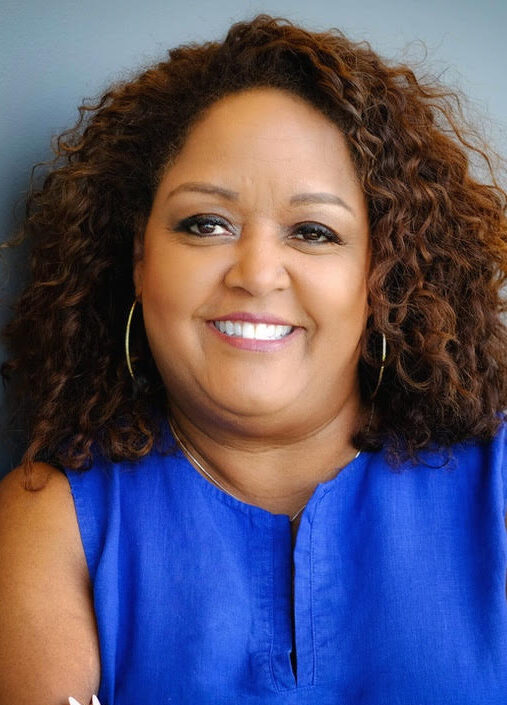 NPR announced the creation of a Station Investigations Team Wednesday, to be led by Cheryl W. Thompson (pictured), an NPR reporter who also is board president of the Investigative Reporters and Editors.
NPR announced the creation of a Station Investigations Team Wednesday, to be led by Cheryl W. Thompson (pictured), an NPR reporter who also is board president of the Investigative Reporters and Editors.
Thompson, a “22-year veteran of The Washington Post who joined NPR in 2019, will work with stations to report ambitious investigative projects,” the announcement said.
“The team, funded by the Corporation for Public Broadcasting, will include a producer and a data editor who will advise reporters who’d like technical help with skills such as data collection and analysis and freedom of information requests. The team will also help facilitate stations’ opportunities to localize NPR investigations through webinars and open-source data.
” ‘On any given day there are major stories developing in communities all across the country,’ said Tamar Charney, acting senior director of collaborative journalism. ‘This new investigative unit is the latest way NPR is partnering with station based reporters to provide support and resources to help them report on issues that affect Americans’ lives — from the safety of the water where we live to the ability of our local health systems to respond to the pandemic.”
- Tyler Falk, Current: CEO John Lansing discusses NPR’s diversity efforts, budget deficit and growing podcast competition
“A look at the history of black Louisville,” from WLKY-TV, is a part of Hearst’s “Project CommUNITY” diversity effort. (video)
Hearst, Vice Media Release Diversity Figures
Hearst, a media company with interests in television, magazines, newspaper and financial information, released its first U.S. diversity and inclusion report on Tuesday, Chase DiFeliciantonio reported Wednesday for the San Francisco Chronicle, a Hearst newspaper.
“The report found that as of December 73% of the company’s full-time and part-time U.S. employees were white while 8% were Black or African American. Another 8% were Hispanic or Latino and another 8% were Asian. About 3% of employees were multiracial while less than 1% were American Indian. Fewer than 1% of employees were Alaska Natives, Native Hawaiians, or other Pacific islanders.”
“CEO Steven Swartz said in a statement accompanying the report that Hearst would compile it annually. ‘Clearly, we have work to do so that our workforce — at all levels — reflects the communities that we serve,’ he wrote. The company also outlined programs to increase diversity and inclusion in the workplace and its products as part of the report.”
DiFeliciantonio also wrote, “The report also found 78% of employees who were managers or above were white, as were 64% of new hires over the last 12 months.
“Black or African Americans and Hispanic or Latino people made up 5% of managers or above respectively, while 9% of those roles were held by Asian people, along with 2% who were multiracial.
“American Indians or Alaska Natives made up less than 1% of managers and new hires respectively, as did people who identified as Native Hawaiian or other Pacific islanders.”
DiFeliciantonio added, “The Pacific Media Workers Guild, which represents workers at The Chronicle and other publications, has brought complaints alleging pay discrimination at the company along gender, age, and racial lines. The Chronicle has denied those disparities exist.”
. . . Diversity Gains in Vice Executive Team
Separately, Manori Ravindran reported Thursday for Variety, “A seismic shift in the work culture and make-up of Vice Media Group (VMG) under CEO Nancy Dubuc appears to be paying dividends, as per the company’s 2020 Diversity, Equity and Inclusion (DEI) report, which reveals that women now comprise over half of the Shane Smith-founded company’s global workforce.”
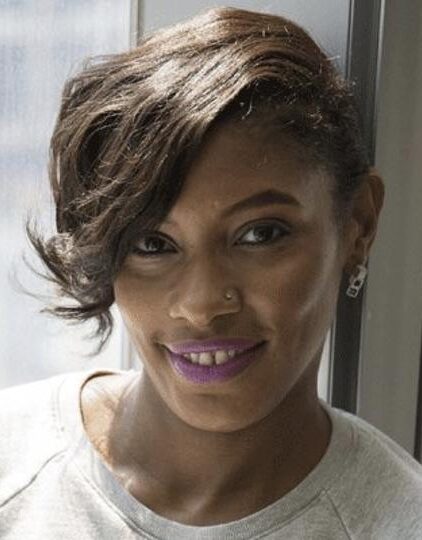 Ravindran’s story continued, “In the U.S., there was a 3.9% increase in employees who identify as BIPOC (Black, Indigenous and People of Color), with 42% of total U.S. staff identifying as such. Over half of new hires were BIPOC-identifying (54%), signifying growth of 9.12%. Meanwhile, of the BIPOC new hires, 21% identified as Black or African American. . . .
Ravindran’s story continued, “In the U.S., there was a 3.9% increase in employees who identify as BIPOC (Black, Indigenous and People of Color), with 42% of total U.S. staff identifying as such. Over half of new hires were BIPOC-identifying (54%), signifying growth of 9.12%. Meanwhile, of the BIPOC new hires, 21% identified as Black or African American. . . .
“Perhaps most impressive are the gains in BIPOC representation across the U.S. executive team. In 2019, this group was 80% white and 20% BIPOC. In 2020, it was 57% white and 43% BIPOC. For the first time, there are executives who identify as Hispanic and Two or More Races.”
As one example, In September, Refinery29 named Simone Oliver (pictured above), former New York Times editor and Facebook executive, to be global editor-in-chief.
According to the Vice website, in addition to Vice on TV and Vice Studios, “Vice Media Group’s portfolio includes Refinery29, the leading global media and entertainment company focused on women; PULSE Films, a London-based next-generation production studio with outposts in Los Angeles, New York, Paris and Berlin; i-D, a global digital and bimonthly magazine defining fashion and contemporary culture; and Garage, a digital platform and biannual publication converging the worlds of art and design.”
Brighter Futures for 2 at VOA With Trump Gone
“The Biden administration continued its swift sweep of the leadership at the Voice of America and its parent agency on Thursday. It pushed out VOA’s director, a Trump ally named Robert R. Reilly who had been appointed just last month,” David Folkenflik reported Jan. 21 for NPR.
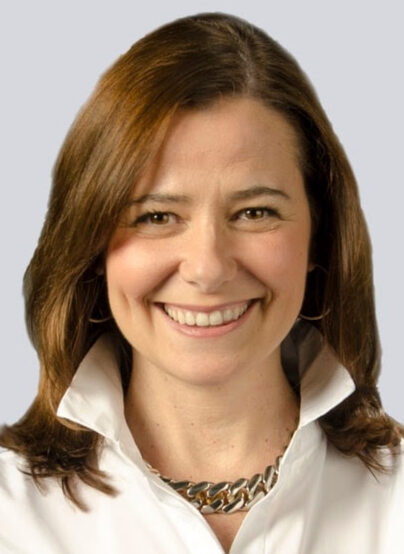 Folkenflik also reported, “The new acting director of Voice of America is Yolanda Lopez (pictured), a veteran journalist who had led VOA’s News Center until last week. On Jan. 12, Lopez was stripped of all editorial oversight of the English-language news hub after one of her White House reporters posed pointed questions to then-Secretary of State Mike Pompeo about his remarks, made after the presidential election, about a second Trump administration.
Folkenflik also reported, “The new acting director of Voice of America is Yolanda Lopez (pictured), a veteran journalist who had led VOA’s News Center until last week. On Jan. 12, Lopez was stripped of all editorial oversight of the English-language news hub after one of her White House reporters posed pointed questions to then-Secretary of State Mike Pompeo about his remarks, made after the presidential election, about a second Trump administration.
 “Reporter Patsy Widakuswara (pictured), who was demoted twice in 24 hours after the incident, approached Pompeo after he made a formal address and then shared the stage with Reilly at an event held at VOA’s headquarters in Washington. She then challenged Reilly over failing to ask Pompeo any questions about the siege of Congress by a pro-Trump mob. Reilly barked at Widakuswara, ‘You obviously don’t know how to behave.’ It then fell to Robbins, who had previously worked for Pompeo at the State Department, to tell the reporter she was done. . . .”
“Reporter Patsy Widakuswara (pictured), who was demoted twice in 24 hours after the incident, approached Pompeo after he made a formal address and then shared the stage with Reilly at an event held at VOA’s headquarters in Washington. She then challenged Reilly over failing to ask Pompeo any questions about the siege of Congress by a pro-Trump mob. Reilly barked at Widakuswara, ‘You obviously don’t know how to behave.’ It then fell to Robbins, who had previously worked for Pompeo at the State Department, to tell the reporter she was done. . . .”
VOA previously reported, “Until being reassigned, Widakuswara covered the White House for VOA’s website, TV and radio, and also hosted a podcast for the Indonesian language service, where she started as a reporter.” She is a native of Jakarta, the capital.
VOA added about Lopez, “A native of Barcelona, Spain, she started her career in broadcasting at a Telemundo affiliate in Irving, Texas, before joining the Spanish language television network Univision affiliates KMEX-TV in Los Angeles, California and WGBO-TV in Chicago, Illinois. Throughout her professional career, she has worked as on-air talent, writer, producer, executive producer and news director in highly competitive news markets. Her main area of expertise has been Latin America and the Latino community in the U.S.”
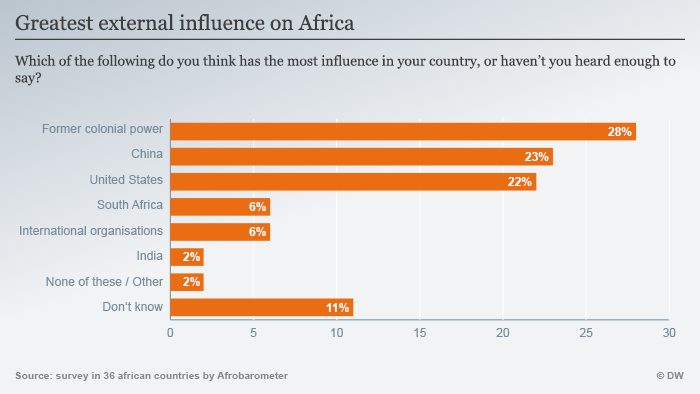
China Investing Massively in African Media
“Unknown to many, China has been investing massively in Africa’s media as a strategy to achieve its longer-term ambitions,” Chrispin Mwakideu reported Jan. 29 for Germany’s Deutsche Welle.
“The Asian giant aims to positively shape its image by offering free content to local news outlets. By employing state-funded TV, radio, online, and social media outlets, Beijing has successfully built the largest network of correspondents worldwide through its Xinhua News Agency, according to Joseph Odindo (pictured below), a former editorial director at Kenya’s Nation Media Group (NMG), and Standard Group.
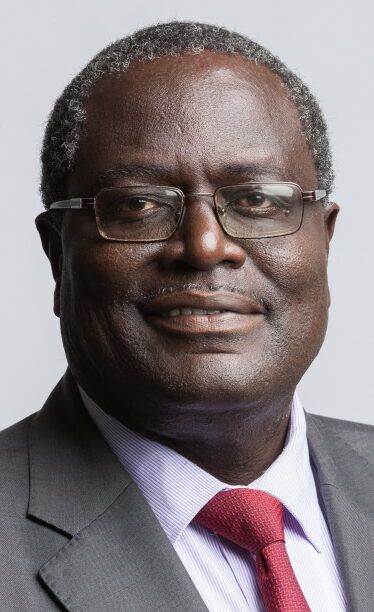 Mwakideu also wrote, “Chinese investment in Kenya’s media industry has created 500 jobs — up to 300 of those are journalists on television and radio. They have also introduced state-of-the-art technology and trained many budding journalists.”
Mwakideu also wrote, “Chinese investment in Kenya’s media industry has created 500 jobs — up to 300 of those are journalists on television and radio. They have also introduced state-of-the-art technology and trained many budding journalists.”
Mwakideu added, “China also took the opportunity to help some media houses out of a financial slump. Media companies across much of sub-Saharan Africa have been feeling the pinch brought about by the digital disruption, the flight of audiences, and advertisements. China offered The Standard Group a supplement every fortnight, which would leave them open to publishing Chinese commentaries and other stories. But things didn’t work out as planned.
” ‘We had a serious disagreement with them when we published an investigative report on Kenya’s SGR railway project funded by China,’ Odindo noted.
“The investigative story examined the difficult process of building the railway and how it cost vast sums of tax-payers money to simply maintain it. ‘The Chinese Embassy and their communications manager canceled all their advertisements with The Standard and withdrew the supplement,’ Odindo said.
” ‘They demanded that we had to stop negative coverage. “
Short Takes
- “Today we [kick off] off our Black History Month series, and we begin with a face that may be familiar to many of you,” KYW-TV told viewers on Tuesday. “CBS3’s Janelle Burrell sat down for a socially distant conversation with the legendary, former Eyewitness News reporter Trudy Haynes, who transformed the face of the news industry. She’s now 94.
- “More of those who identified themselves as Black than those in other groups said they’d trust journalists more if they knew what the journalists thought, while conservatives were more likely than liberals to trust journalists who keep their views private,” Ben Smith reported Sunday for The New York Times. Smith, a Times media columnist, was writing about the disputes within news organizations over the use of social media. To the statement, “I prefer to know about my favorite journalist’s personal political and/or social views,” 36 percent told the Morning Consult polling firm that they strongly agreed or somewhat agreed; as did 45 percent of Blacks, 34 percent of whites and 32 percent of Hispanics.
 Idaho Education News reporter Sami Edge (pictured), a 2019-20 Community Listening Fellow with the American Press Institute, “wanted to examine education inequities experienced by Latino students in the state. But she wanted to base her reporting on extensive input from the students themselves,” Stephanie Castellano reported Jan. 21 for the institute. “Edge joined forces with Nicole Foy, an investigative reporter with the Idaho Statesman who covers Latino affairs and had already built relationships with Latino communities across the state. Together and with support from API and the Education Writers Association, they launched the Latino Listening Project.” They “heard directly from the affected groups and allowed their insights to guide their reporting. Perhaps the most meaningful part of the project was the virtual event at which students spoke directly with Idaho Gov. Brad Little.”
Idaho Education News reporter Sami Edge (pictured), a 2019-20 Community Listening Fellow with the American Press Institute, “wanted to examine education inequities experienced by Latino students in the state. But she wanted to base her reporting on extensive input from the students themselves,” Stephanie Castellano reported Jan. 21 for the institute. “Edge joined forces with Nicole Foy, an investigative reporter with the Idaho Statesman who covers Latino affairs and had already built relationships with Latino communities across the state. Together and with support from API and the Education Writers Association, they launched the Latino Listening Project.” They “heard directly from the affected groups and allowed their insights to guide their reporting. Perhaps the most meaningful part of the project was the virtual event at which students spoke directly with Idaho Gov. Brad Little.”
- The Student Press Law Center kicked off our activities for the Feb. 26 “Student Press Freedom Day 2021: Journalism Against the Odds” with an “op-ed boot camp” with veteran journalist Steven Holmes, formerly of The New York Times, The Washington Post and CNN. “The goal of this boot camp is to empower student journalists to write op-eds about student press freedom for Student Press Freedom Day, “and equip you to pitch and place these opinion pieces in your local daily newspaper.”
The billboards in Kansas City are just one protest of the Kansas City team’s name. In Tampa, site of the Super Bowl Sunday, Florida Indigenous Rights & Environmental Equality is also preparing to make its views known. (video)
- “More people around the country watching the Kansas City Chiefs means more eyeballs on the Tomahawk Chop” and the name of the team. Now the team is under new pressure to stop it,” Sherae Honeycutt reported Thursday for WDAF-TV in Kansas City in advance of Sunday’s Super Bowl. “It’s a controversy Chiefs Kingdom has faced for years, but now drivers on some metro highways can’t ignore it. . . . two billboards are asking the Chiefs to change. One is located off I-70 near the Benton Blvd exit, and another near 103rd & I-435.”
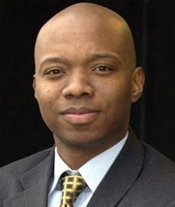 “After five years at MSNBC — over two presidential campaigns and year one of the pandemic — I’m departing the network at the end of March,” Errol Cockfield (pictured), senior vice president, communications at MSNBC & NBC News,” announced Thursday on LinkedIn. “Sandwiched between these landmarks, I’ve also had a front row seat as our society grapples with an historic reckoning on race in America. . . . Before my next adventure I’m going to take a much-needed break to reflect, recharge and reconnect with family and friends. . . .” Cockfield is a former reporter for Newsday and onetime president of the New York Association of Black Journalists.
“After five years at MSNBC — over two presidential campaigns and year one of the pandemic — I’m departing the network at the end of March,” Errol Cockfield (pictured), senior vice president, communications at MSNBC & NBC News,” announced Thursday on LinkedIn. “Sandwiched between these landmarks, I’ve also had a front row seat as our society grapples with an historic reckoning on race in America. . . . Before my next adventure I’m going to take a much-needed break to reflect, recharge and reconnect with family and friends. . . .” Cockfield is a former reporter for Newsday and onetime president of the New York Association of Black Journalists.
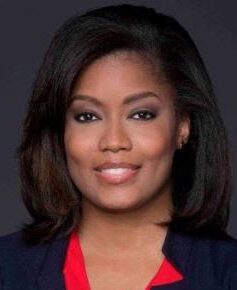 Rashida Jones (pictured), who took the helm of MSNBC on Monday as the first Black journalist to head a mainstream network, “unveiled a new organizational structure that puts greater emphasis on the difference between breaking news programming, and analysis and opinion shows,” Ted Johnson reported Monday for Deadline. “Jones also said that the network, seeking to expand longform content, would be adding a head of documentary acquisitions, with an announcement in the coming weeks. . . .”
Rashida Jones (pictured), who took the helm of MSNBC on Monday as the first Black journalist to head a mainstream network, “unveiled a new organizational structure that puts greater emphasis on the difference between breaking news programming, and analysis and opinion shows,” Ted Johnson reported Monday for Deadline. “Jones also said that the network, seeking to expand longform content, would be adding a head of documentary acquisitions, with an announcement in the coming weeks. . . .”
- By action of the city council in Raleigh, N.C., “The home of Josephus Daniels, a white supremacist and former publisher of The News & Observer, is no longer a local historic landmark,” Anna Johnson and Richard Stradling reported Tuesday for the newspaper. They also wrote, “Daniels used The N&O to incite fear of Black residents and political leaders and helped orchestrate the 1898 race riot in Wilmington [N.C.]. That insurrection overthrew a mixed-race government and resulted in the killings of at least 60 Black residents.”
- During its Winter Press Tour, “PBS announced an open call for submissions for long and short form films by next generation content creators. This initiative will further amplify the voices of diverse/BIPOC producers across public media, inviting submissions that explore a broad range of experiences, perspectives and points of view,” the network reported Tuesday.
- “Fox Soul has announced Fox Soul’s Screening Room, a weekly, hour-long program meant to highlight and celebrate short films created by Black filmmakers. The debut episode will be hosted by Vivica A. Fox and premiere on Thursday, Feb. 18, at 7 p.m. PT,” Mark K. Miller reported Wednesday for TVNewsCheck. “James DuBose, executive producer and head of programming at Fox Soul, said: ‘We are no longer waiting for media giants or traditional greenlighting protocol to discover and share exceptional bodies of work within our own community ‘.”
- TIME 100 honoree and “How to Be an Antiracist” author Ibram X. Kendi are partnering on a project about marking this moment as a Black cultural renaissance. Among other features, “The package includes a conversation between former First Lady Michelle Obama and National Youth Poet Laureate Amanda Gorman,” Time reported.
- Starting Monday, PBS’ “The American Experience” is showing “Goin’ Back to T-Town.” It is the “story of Greenwood, an extraordinary Black community in Tulsa, Oklahoma, that prospered during the 1920s and 30s despite rampant and hostile segregation. Torn apart in 1921 by one of the worst racially-motivated massacres in the nation’s history, the neighborhood rose from the ashes.” Originally broadcast in 1993, Carmen Fields, a public affairs producer at WHDH-TV Boston messages, “I am credited as a writer on the film about my hometown, but I was involved in the team in many additional ways. For example, the title of the documentary ‘Goin’ Back to T-Town’ and theme music come from a song written and recorded in 1939 by my father’s big band (Ernie Fields Orchestra).”
- Among changes at the Los Angeles Times, sports and culture columnist LZ Granderson is moving to Op-Ed as a columnist,and “Donovan X. Ramsey is joining The Times to cover Black Los Angeles,” the news organization reports. “He comes to L.A. after an impressive career as a long-form writer for such publications as GQ, Vice, WSJ Magazine and the Atlantic.” In addition, “Cindy Chang has joined the City Desk as an assistant editor after a long and successful run on the law enforcement team.” Further, Angel Jennings, the Times’ assistant managing editor of culture and talent, announced that Joseph Serna is the new deputy editor of culture and talent. In that role, he will “help advance the company’s efforts to promote diversity, equity, inclusion and access.” Also, “Marissa Evans is joining the Los Angeles Times as a health reporter with a focus on covering Southern California’s communities of color. She comes from the Star Tribune in Minneapolis.”
- “As media organizations continue to scrutinize their diversity and equity initiatives following last summer’s industry-wide reckoning, some are turning their attention to the core of every story — sources,” Angela Fu reported Wednesday for the Poynter Institute. “Two new source databases — one from the Asian American Journalists Association, the other from Spotlight PA — have sprung up in recent months to make it easier for journalists to diversify their stories’ sources. AAJA’s database, part of its new AAJA Studio initiative, highlights Asian American and Pacific Islander subject matter experts, while the Spotlight PA Diverse Source Database focuses on Pennsylvania-based experts.”
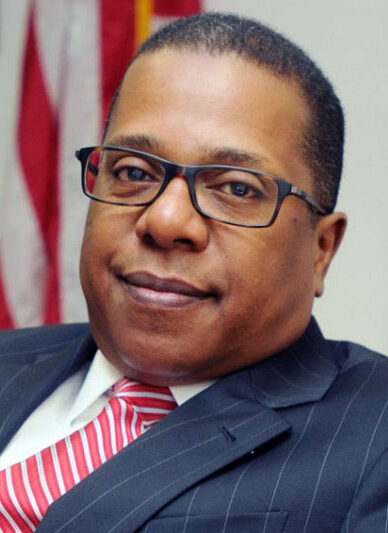 Joshua Goodman and Claudia Torrens of the Associated Press, reporting Tuesday on the expected appointment of Brian A. Nichols (pictured), the current U.S. ambassador to Zimbabwe, as assistant secretary of state for Western Hemisphere affairs, zeroed in the significance. “Christopher Sabatini, a specialist on the region at Chatham House in London, said the U.S. having Nichols in the Latin America post would send a message of solidarity to minorities in the region, where descendants of the Atlantic slave trade have traditionally been underrepresented in positions of diplomatic power, as in the U.S. Foreign Service.” Sabatini called Latin America “a region that has been marked by marginalization, and racism, division.”
Joshua Goodman and Claudia Torrens of the Associated Press, reporting Tuesday on the expected appointment of Brian A. Nichols (pictured), the current U.S. ambassador to Zimbabwe, as assistant secretary of state for Western Hemisphere affairs, zeroed in the significance. “Christopher Sabatini, a specialist on the region at Chatham House in London, said the U.S. having Nichols in the Latin America post would send a message of solidarity to minorities in the region, where descendants of the Atlantic slave trade have traditionally been underrepresented in positions of diplomatic power, as in the U.S. Foreign Service.” Sabatini called Latin America “a region that has been marked by marginalization, and racism, division.”
- “The arrest of a former Mexican governor on charges he ordered the torture of a journalist gave hope to activists who believe the case could reveal the ties between powerful businessmen, politicians and organized crime and strike a blow against Mexico’s notorious impunity,” Maria Verza reported Thursday for the Associated Press. “Mario Marín, who governed the central state of Puebla from 2005 to 2011 for the Institutional Revolutionary Party, was arrested Wednesday in Acapulco and transported to a jail in Cancun. He is charged with human rights violations in relation to the illegal arrest and torture of journalist Lydia Cacho who in her 2005 book had detailed the role of other powerful men in a pedophilia ring that preyed on young girls.”
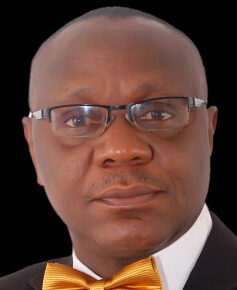 The International Press Centre in Lagos, Nigeria, said it was “greatly concerned” about reported threats on the life of investigative journalist Ibanga Isine (pictured), who said “he was forced to abandon his home after the death threats became intolerable. He believes his ordeal is directly connected with the reports on massacres in the south of Kaduna State-Nigeria by his investigative online news medium.” The group quoted Isine: “I have been investigating the Southern Kaduna killings for months now, and I have just recently published the last part in a four-part series on the bloody attacks in the zone. In the course of the investigation, two of my sources have been attacked, one was killed along with his son three months after he said he was afraid for his life. Another source escaped being killed and his neighbours paid dearly when the killers didn’t find him.”
The International Press Centre in Lagos, Nigeria, said it was “greatly concerned” about reported threats on the life of investigative journalist Ibanga Isine (pictured), who said “he was forced to abandon his home after the death threats became intolerable. He believes his ordeal is directly connected with the reports on massacres in the south of Kaduna State-Nigeria by his investigative online news medium.” The group quoted Isine: “I have been investigating the Southern Kaduna killings for months now, and I have just recently published the last part in a four-part series on the bloody attacks in the zone. In the course of the investigation, two of my sources have been attacked, one was killed along with his son three months after he said he was afraid for his life. Another source escaped being killed and his neighbours paid dearly when the killers didn’t find him.”
[btnsx id=”5768″]
To subscribe at no cost, please send an email to journal-isms+subscribe@groups.io and say who you are.
Facebook users: “Like” “Richard Prince’s Journal-isms” on Facebook.
Follow Richard Prince on Twitter @princeeditor
Richard Prince’s Journal-isms originates from Washington. It began in print before most of us knew what the internet was, and it would like to be referred to as a “column.” Any views expressed in the column are those of the person or organization quoted and not those of any other entity. Send tips, comments and concerns to Richard Prince at journal-isms+owner@
View previous columns (after Feb. 13, 2016).
View previous columns (before Feb. 13, 2016)
- Diversity’s Greatest Hits, 2018 (Jan. 4, 2019)
- Book Notes: Is Taking a Knee Really All That? (Dec. 20, 2018)
- Book Notes: Challenging ’45’ and Proudly Telling the Story (Dec. 18, 2018)
- Book Notes: Get Down With the Legends! (Dec. 11, 2018)
- Journalist Richard Prince w/Joe Madison (Sirius XM, April 18, 2018) (podcast)
- Richard Prince (journalist) (Wikipedia entry)
- February 2018 Podcast: Richard “Dick” Prince on the need for newsroom diversity (Gabriel Greschler, Student Press Law Center, Feb. 26, 2018)
- Diversity’s Greatest Hits, 2017 — Where Will They Take Us in the Year Ahead?
- Book Notes: Best Sellers, Uncovered Treasures, Overlooked History (Dec. 19, 2017)
- An advocate for diversity in the media is still pressing for representation, (Courtland Milloy, Washington Post, Nov. 28, 2017)
- Morgan Global Journalism Review: Journal-isms Journeys On (Aug. 31, 2017)
- Diversity’s Greatest Hits, 2016
- Book Notes: 16 Writers Dish About ‘Chelle,’ the First Lady
- Book Notes: From Coretta to Barack, and in Search of the Godfather
- Journal-isms’ Richard Prince Wants Your Ideas (FishbowlDC, Feb. 26, 2016)
- “JOURNAL-ISMS” IS LATEST TO BEAR BRUNT OF INDUSTRY’S ECONOMIC WOES (Feb. 19, 2016)
- Richard Prince with Charlayne Hunter-Gault,“PBS NewsHour,” “What stagnant diversity means for America’s newsrooms” (Dec. 15, 2015)
- Book Notes: Journalists Follow Their Passions
- Book Notes: Journalists Who Rocked Their World
- Book Notes: Hands Up! Read This!
- Book Notes: New Cosby Bio Looks Like a Best-Seller
- Journo-diversity advocate turns attention to Ezra Klein project (Erik Wemple, Washington Post, March 5, 2014)
.
![]()

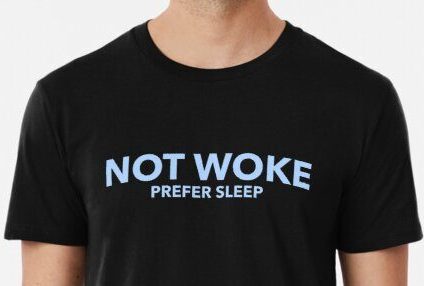
17 comments